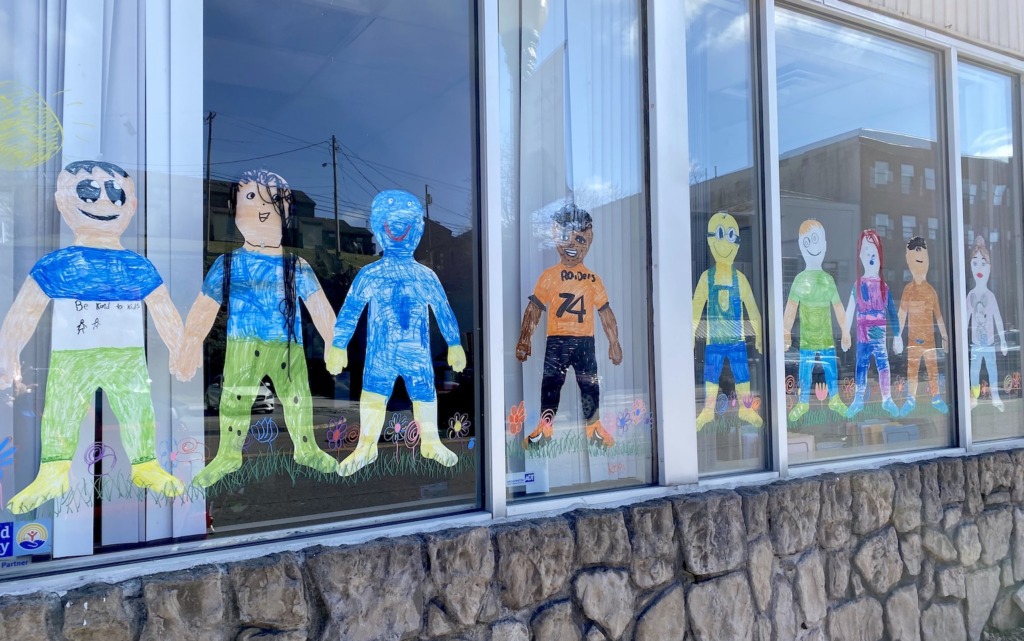State grant assists in addressing range of issues in Roanoke, Norton areas
The colorful images of children, decorated by children, peered from windows and walls in the Roanoke and Norton areas during April — National Child Abuse Prevention Month — as a reminder that any child in any neighborhood may need help and protection.
The project was the brainchild of Commonwealth Catholic Charities’ (CCC) foster care programs in Roanoke and Norton, which increased their service this spring to include child abuse prevention education. The service, offering classes and other resources to families at risk, focuses on the causes of child abuse and neglect in order to prevent them from occurring by providing case management and parent and community education.
“There is a focus nationally and in Virginia to expand child abuse and neglect prevention services, to look at how to equip families and communities to prevent it from happening in the first place,” said Lydia Strawbridge, treatment foster care programming manager for CCC in Roanoke.
The children’s artwork program aims to involve everyone in spreading the word about prevention and to raise awareness about how to support families in need of help.
In Roanoke, children in the after-school program at the Kirk Family YMCA colored pictures to display at CCC’s offices throughout the month. In the Norton area, elementary, middle and high school students decorated three-foot-tall “cardboard kids” – child-sized cutouts – which were then placed in the windows and on walls of local buildings around town.
‘Worsened situations’
Last fall, CCC received a grant from the Virginia Department of Social Services for a year of preparation, training and resources to implement the new program, which launched during Child Abuse Prevention Month. Although CCC has several offices across the state, two localities were chosen for the funding because of specific needs: refugee and immigrant families in Roanoke and rural families in the Norton area.
The timing was critical, as needs have risen precipitously, Strawbridge noted.
“The ongoing pandemic has worsened many of these situations,” she said.
These underserved populations are dealing with a range of issues, Strawbridge explained. Unemployment and under-employment, housing and transportation problems, mental health needs, and substance abuse are ongoing and often interrelated issues, as well as the frequent trauma, stress and cultural challenges experienced by refugee and immigrant families.
Referred families, who have children from infancy to age 12, come through CCC’s resettlement and immigration offices in Roanoke and the Departments of Social Services, schools, health-care providers and counseling centers in Norton. Classes are part of a package of services offered, depending upon a family’s needs.
Norton’s director of operations Cassandra Collins added that the program also benefits parents whose children have been placed in foster care – a reality that also has grown in recent months.
“Some parents whose children are in foster care look at this as a stepping stone to get help and be reunified with their children,” she said. “This program is another set of eyes to guide their parenting skills.”
Group classes are held in CCC offices for eight weeks, with at least five families per group attending a two-hour class weekly at each location. Transportation is available as well.
In-home support
Program specialists have been trained to use the “Triple P” (“Positive Parenting Program”) model, a broad-based intervention that is widely used and supported by evidence- based research.
The grant enabled foster care specialist Candy Campbell in Roanoke and child abuse prevention specialist Kimberly Lawson in Norton to receive several months of training for the prevention model certification.
Parents participate in a range of exercises and assessments before and after the program. Besides curriculum-based discussion and education, parents also receive information on local resources to help them upon completion of the classes.
Furthermore, specialists will work one-on-one with individuals and families if their needs are identified as higher than a group setting might address.
In addition, in-home services will provide extra support for participants to learn and practice healthy parenting skills in their home setting, Collins explained.
“In-home parenting support will be offered to families who are considered to be at higher risk for child maltreatment,” she said. Those families may refer themselves, be referred through DSS or court systems, or request support services after completing group education classes.
The classes have been well received so far by the eight families in Roanoke and seven in Norton who are participating in the program, Campbell said. Due to privacy issues, those families declined to comment.
‘Strengthened faith’
In Roanoke, interpreters help bridge the language barrier, and participants are gaining trust and sharing their concerns and struggles.
“I’m not there to judge them; I’m there to work with them,” said Campbell. “I tell them I’m a parent, too.”
“Our goal is making it comforting to the parents,” added Lawson. “I’m a special-needs mom myself. We really support and encourage them, and we put ourselves out there with them.”
CCC’s emotionally hard work is worth it because it makes such a difference, observed Campbell. “Every year, someone reaches out to me to say how this kind of help changed their lives, and that gives me hope. It has strengthened my faith.”
Strawbridge agreed. “Doing this humbling work with my colleagues – helping with the pain and struggles of others – gives us all a sense of moving forward together and serving something bigger.”
The program’s increased visibility through the art projects, as well as a community-wide expo held on April 30 in Norton in partnership with Wise County and the City of Norton’s Department of Social Services and Scott County’s Imagine Fostering, is helping to make it better known and accessible.
“We really need to continue to draw communities’ attention to these issues,” Strawbridge said. “The more light that shines in dark spaces, the more we can help people.”
Editor’s note: For more information and resources, visit www.cccofva.org.

